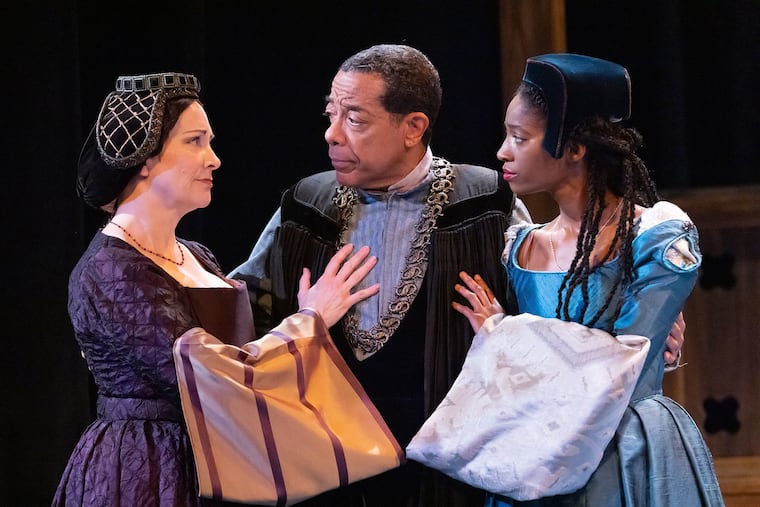‘A Man for All Seasons’ marks a new live beginning at Philly’s Lantern Theater
Peter DeLaurier’s sturdy, often gripping production has an old-fashioned feel.

Henry VIII never seems to go out of fashion. He looms over the Broadway musical Six, with his six wives as pop divas competing over their woeful fates. His court’s intrigues animated Hilary Mantel’s award-winning Tudor trilogy, which spawned both stage and television adaptations.
And the king’s efforts to trade in wife one (Catherine of Aragon) for wife two (Anne Boleyn) form the backdrop of Robert Bolt’s classic 1960 drama, A Man for All Seasons, which marks Lantern Theater Company’s return to live performances.
Peter DeLaurier’s sturdy, often gripping production — on the proscenium stage of the Plays & Players Theatre through April 10 — has an old-fashioned feel. Bolt’s characters and language, accented by Christopher Colucci’s lush original music, retain their Shakespearean grandeur. James F. Pyne Jr.’s set, comprising a Gothic staircase and a table and chairs, doubles as all of the interiors, and Kelly Myers’ period costumes denote the characters’ arcs from penury to power (or vice versa).
A Man for All Seasons, like Arthur Miller’s The Crucible (written just seven years earlier), depicts the struggles of a man of conscience trying his best to bend, rather than break, under the pressures of his times. Sir Thomas More (Frank X), a devout Catholic, lawyer, writer, philosopher, and for a while the king’s lord chancellor, has a good life that he wants to keep, if he can. His chief antagonist is Thomas Cromwell (Anthony Lawton), a rising politician who seeks More’s express submission to the king’s religious and marital designs.
Bolt’s fictional (and unabashedly heroic) More is at once medieval, in his attempted obeisance to both king and church, and modern, in his insistence on the primacy of selfhood — and, perhaps, also in his reliance on his legal skills as an escape route. Paul Scofield won both a Tony and an Oscar for his indelible portrayals of More, and Frank X seems at times to be channeling Scofield. He captures More’s eloquence and intellectual pride, and the poignancy of his farewells.
Lawton is riveting and chilling as Cromwell, whose attachments are only to the fulfillment of the king’s whims and his own ambitions. (Mantel’s Wolf Hall, privileging Cromwell’s perspective, depicts More with distaste and notes that his Catholic commitment included authorizing the burning of several Protestant heretics.)
Lantern’s cast is impressive. It was a jolt to discover that Gregory Isaac had morphed from Cardinal Wolsey, Cromwell’s patron, to the wily Spanish ambassador, Eustace Chapuys, sporting the show’s most convincing accent. (No one really sounds British, but the leads tend to enunciate more elegantly than the supporting players.)
Benjamin Brown is a splendid Duke of Norfolk, More’s friend and, later, judge. Mary Elizabeth Scallen is a stronger-than-usual Lady Alice, More’s put-upon wife, and Morgan Charéce Hall is both graceful and commanding as More’s beloved, well-educated daughter, Margaret.
Jake Blouch is more buffoonish than regal or menacing as King Henry VIII (and doubles as William Roper, Margaret’s Lutheran suitor). Paul Harrold seems more naive schoolboy than villain as Richard Rich, who trades his soul for Wales.
Scott Greer brings his customary presence to the Brechtian role of the Common Man. An occasional narrator, he transforms from More’s steward to a boatman, a publican, a jailer, a jury foreman, an executioner — and, finally, a character who insists that we recognize ourselves in him.
“A Man for All Seasons” is presented by Lantern Theater Company at Plays & Players Theatre, 1714 Delancey Place, through April 10. Masks and vaccination proof required. Tickets: $25-$41. Information: lanterntheater.org or 215-829-0395.